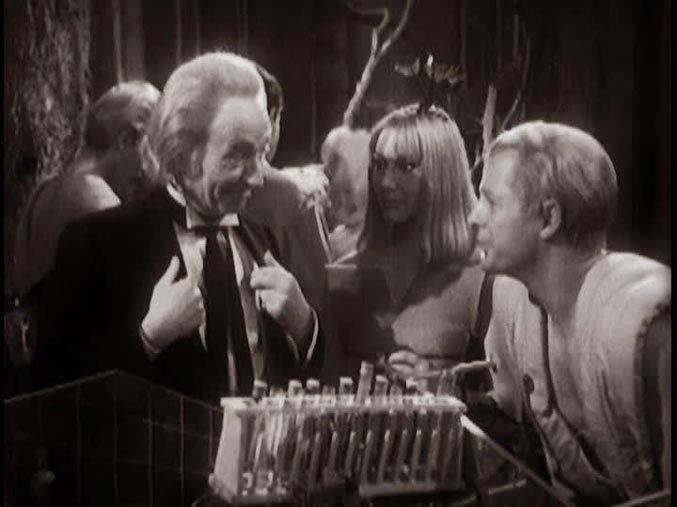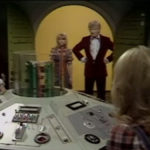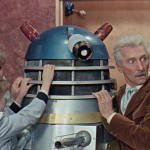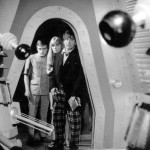Temporal paradoxes, vintage wines and the coolest tricycle chase ever!
The Doctor, Susan, Barbara and Ian arrive on the planet Skaro, where war has been raging between the Thal and the Daleks for 500 years.
Podcast: Play in new window | Embed
The Doctor, Susan, Ian and Barbara arrive on the planet Skaro only to realise that it’s entirely barren – petrified, even! They see a strange city in the distance. Ian, wisely, explains that the most likely outcome of going towards said city is death and that they ought to return home. The Doctor, however, while pretending to agree with him, actually sabotages the TARDIS and tricks them into exploring the city for a means to repair it, only in order to satisfy his own curiosity.
Once there, they’re captured by the evil Daleks, then rescued by the good-natured and hunky Thal, then captured and rescued and captured again. And, finally, rescued again, only to realise that they need to face-off with the Daleks again in order to get home, in the process of which they get captured.
An incredibly complicated and dangerous mission is proposed, wherein Hunk #4 is killed in a whirlpool of Angel Delight. You have to watch this one and then laugh along with us. Essentially, it’s established, once again, that the Doctor is a selfish bastard, only intent on exploring and escaping by himself. How wonderful!
(The Ratings and Reviews of this Doctor Who story kick in at the 55m50s mark.)
























Enjoyed your review of “The Daleks,” guys! You did a nice job of not being afraid to have some fun with the story — goodness knows it cries out for it at points — but also giving it its due. I’ve watched it several times in a row, all seven episodes, for a blog post I was working on; and it remains remarkably entertaining and absorbing each time.
Here’s a nitpick for you: the petrified metal creature is revisited once later during the serial (episode 3 or 4, I don’t recall exactly) – it’s called a Magnedon on-screen, and Alydon (I think) says it can be used to “recharge the torch.” How they’ll do that from a dead, petrified one, and whether Magnedons can fulfill that purpose when alive, who knows?
Also this: the reference to birds in the air is one of three in the first three stories, isn’t it? In “An Unearthly Child,” the Doctor asks Ian if seeing “birds wheeling in an alien sky” would satisfy him; here, as you point out, the Doctor says the Thals may yet hear birds in their skies; and, in “The Edge of Destruction” (whichi s nowhere NEAR as bad as “Spock’s Brain”!!!) as the scanner shows them the picture of the planet where they “almost lost the Tardis,” the audio is playing the sounds of birds squawking. Coincidence? (Well, yes, most likely!)
Thanks again for a great podcast! (Mike Poteet, @Bibliomike)
Hi Mike,
Thanks for the great comment! Glad you enjoyed our review. To this date, “The Daleks” remains one of my favourites. Also, mega gracias for the Magnedon info. That had completely eluded me. I shall add it to the Visual Index posthaste!
As for the bird theory… Well, I’m not gonna lie. I’m a little sceptical. Then again, birds are brought up (or rather the absence of them is) in “Dalek Invasion of Earth”, so perhaps you’re on to something there, after all. Actually, as I recall, Flappy and I devised a Dalek Bird Theory of our own at the end of that review. So let’s make a point of tracking that trope to see if we can get to the bottom of this avian conundrum…
Lastly, please feel free to submit the link to your blog post!
Thanks for listening!
Ponken
My pleasure! Thanks for inviting me to share the link to my blog post. My take on “The Daleks” is here: http://thescifichristian.com/2013/12/retro-tardis-talk-the-daleks-story-2-december-21-1963-february-2-1964/. And, two years ago, I looked at “An Unearthly Child”: http://thescifichristian.com/2011/11/retro-tardis-talk-%E2%80%9Can-unearthly-child%E2%80%9D-november-23-december-14-1963/
I’m going to try and work my way through the classic Doctors in more or less chronological order (though not at the current glacial pace I’ve got going!) I’ve only been watching the show since 2010 (fell in love with “The Eleventh Hour”), but am certainly eager to learn more about all that has gone before.
Such an epic adventure for a second serial is truly a bold move. Man I wish this was in color, almost as much as Marco Polo and Marinus.
There’s so much good here that it’s just easier, if not unjust, to talk of the problems first. If the Daleks were run by static electricity everyone’s hair would be standing on end. I see this though as a last resort power source for them. At this point they simply can’t generate power any other way. Had the Thals never made it to the city it’s quite possible the Daleks would have died out, never learning the truth of their radiation needs, and running out of usable power and other resources before they could leave the city. Also they would probably never have cared to leave and/or possibly never ventured into the universe, having already conquered all they know.
Some acting is a little hokey and some bkg chars. Needed a little more development, but the rest is great.
Other than the fossilized creature I see no plot dead ends, only further stories that have yet to be explored and expanded upon. The lizard was supposed to be a native reptile fossilized and somehow metalicised (?) in the fallout. But not everywhere on the planet was devastated, and eventually life and nature finds a way to flourish once again.
This story is only made better by watching Genesis of the Daleks, and much of what we see here is a logical extension of what is shown there.
All main actors have their hearts in this to the full.
4.7
So I am going to come in here with a slightly less positive note. (Sorry, not sorry!) This one isn’t one of my favourites, though some of the later ones, panned on this podcast, I do particularly enjoy, so where would we be without a different opinion or two!
THE DALEKS
In terms of its impact and legacy, ‘The Daleks’ comes second only to ‘An Unearthly Child’. It’s introduction of the Daleks, the arch villains of the series, established Dr Who as a series that would stand the test of time. However, the story needs to be viewed not for its legacy but just for what it is: a whopping 7 episode story that feels like 10.
The TARDIS crew land on Skaro, a dead planet, destroyed and irradiated by a nuclear holocaust. Underneath an abandoned city, live the remnants of the Dalek race. (According to the continuity experts, these are a weaker group of Daleks left behind on the planet after the main group evacuated.) Teaming up with a rather limp bunch of Thals, the Doctor and friends take out the Daleks: more by accident than by design.
THE MAJESTY
There are some excellent aspects to this story. The design overall is very memorable: the forest is alien, the Dalek city designed for machines especially the Dalek monster itself is a design that is instantly recognisable. Indeed, there have been only tiny modifications made to the original design in fifty years, in comparison to the Cybermen, for example. It is a brilliant looking creation, as sinister today as ever. In this, their first outing, they do not just rely on firepower: they are shown as vulnerable, and therefore perhaps even more scheming and cruel than normal.
The idea that the TARDIS crew are all suffering from a real illness: radiation sickness, adds a needed dimension of realism to the story.
THE MISERY
The story is very long and slow, involving lots of tunnels and corridors and lift shafts and wandering about. The plot is convoluted and branches off in different directions without much structure.
The Thals are certainly better characters than the cavemen from ‘An Unearthly Child’. They joke around a little, and there is something approaching a romance with Barbara, but they are still completely 2D.
The whole setting up of straw-man pacifism and its subsequent infantile take-down is very annoying. It undermines the moral value of pacifism as defiance, and Ian’s jingoistic speeches about soldiers being better than farmers feel both dated and irritating.
MAGICAL MOMENTS
The doctor, desperate to look around the city, sabotages the TARDIS, and smugly says that if they want to fix it, they’ll have to go to the city after all.
When Ian discovers the truth, his takedown of the Doctor is highly enjoyable.
The hunky Thal appears outside the TARDIS to Susan like an angelic vision appearing to the Virgin Mary: Do not be afraid!
The Dalek tentacle emerging from the cloak at the end of episode three is delightfully sinister… shame we never come back to it!
There is an extended argument between the TARDIS crew in episode 4. The Doctor and Barbara are all up for using the Thals as cannon fodder while they sneak past the Daleks to steal back the fluid link. Ian and Susan are appalled. It’s great TV. The Doctor even ends up saying ‘My dear boy, this is no time for morals!’ which is quite a statement, especially considering the way the Doctor is portrayed today.
In episode 5, the Daleks realise they have become so dependent on radiation that they will die without it. For one marvellous moment, we experience a tiny glimpse of something approaching sympathy for them. They were scientists, attacked with a neutron bomb. Now they realise they can never repair their world and get back to the way things used to be. But they are Daleks, and their solution is pragmatic, evil and almost nihilistic: irradiate the planet. If we can’t survive in this environment then let us change our environment. It’s great to watch.
The Daleks line up, sucker arms raised in a fascist salute.
Barbara kisses one of the Thals just before jumping into the TARDIS. Lovely moment!
IN SUMMARY
It’s a lot better than the preceding Cavemen episodes, but it’s still long, rambling and slow. The Thals are lame on screen, but the Daleks are lots of fun. Ultimately, this is a story that is better to remember than to actually watch.
Overall: 3.1
Question: Any information as to the continuity problem between the first series in which the Daleks appear and require static electricity, and the Genesis of the Daleks where they roam freely about the planets surface?
Hey Ty!
That’s a super good question. I think their dependency on static electricity had completely gone from my mind by the time we reviewed Genesis. (Do check out that episode, though!) Have you seen Death to the Daleks? They’re powered by telekinesis there…
It’s a real pity — the static electricity plot-element was fascinating. It wouldn’t have been too difficult to work around it, either. In Dalek Invasion of Earth, or at least in the Cushing movie, I’m pretty sure they had some sort of parabolic dish that allowed them to move about freely, to make up for the lack of static electricity conduits or whatnot. Davros could easily have invented that, or said that due to atmospheric wibbly-wobblies on Skaro, they might at some time in his relative future need to rely on static electricity.
I suspect that there isn’t an official, canonical explanation, though. Similar to Daleks suddenly flying up stairs, using their suckers to brainwash people or climbing onto people’s backs and Invasion-of-the-Bodysnatchers’ing them, the BBC probably just changed their minds and tried to make them more menacing. I’m afraid that’s all I got. There are probably tonnes of online fora where this exact plot hole is being scrutinised with greater expertise than I can offer.
In any case, thanks for bringing this up and thanks for tuning in!
L
This serial does a lot of things really well. Coming out of An Unearthly Child, it shows the audience a little more of what the TARDIS can do, not only traveling through time but to an entirely different planet. It also does a good job at dedicating more screentime to Susan, a character who was definitely underutilized in the previous serial. I really enjoy the sequence where she runs back to the TARDIS for the anti-radiation drugs, showing that even though she is a child, she still has agency and can do things on her own.
One of the serial’s biggest strengths is definitely its set design. Some of the landscapes are not just good for the time period; they could stand up to just about any setting Classic Who has to offer. The painted backdrop of the city first shown in Part 1 is breathtaking, the swamp is delightfully disgusting, and the corridors of the Dalek city are appropriately sterile and inhuman. The only setting I don’t feel particularly strongly about is the mountain caves—though to be fair, caves are pretty underwhelming throughout Classic Who. These caves are no worse than others.
Even beyond its successes in set design, this serial sets the gold standard for creature design in the creation of the Daleks. What can I say about them that generations of Whovians haven’t already said? They are unique, deadly, and ruthless, something that seems like it should have been impossible given their goofy shape and the fact that they cannot emote. The robotic voice and shifting eyestalk are enough to lend these creatures that uncanniness feeling which makes them excellent antagonists. I also have the opinion that the idea of the Dalek gets extremely played out over the course of the next 41-and-counting seasons, but for the 1960s, everything about this creature was decades ahead of its time.
For the most part, the Thals are a missed opportunity. None of the Thal characters evoke a strong emotion from me except for Antodus, whom I hate conceptually—beyond being an unlikable coward, Antodus is a blatant device to move the plot forward, and as such is underdeveloped and two-dimensional. Despite this, the Thals are not especially bad by the standards of many of the tribal, homogenous societies Doctor Who will feature in its classic serials. Whenever the showrunners go for this sort of tribal society vs invader dynamic, my critique of the tribes will almost always be about how shallow its characters are. They act as one, with interchangeable characters, never leaving much of an impression on me. Still, I don’t think I can say the Thals were the most offensive aspect of The Daleks.
No, I have to give that honor to the piss-poor climax. What even was that? It took the menace of the Daleks, the inhuman evil of their motivations, and just threw it all out the window, replaced by spinning idiots being knocked over like dominoes. Nothing about that final fight is satisfying, and nothing about the resolution feels earned because of it. Without Part 7, I would have been able to safely place this serial as one of the best in the early era of the series. Instead, I rate it as a good serial that leaves a bad taste in my mouth.
3.9/5